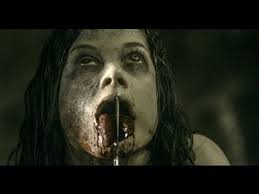记忆方法
记忆“horror”可以将其与“hor-”前缀和“-r”结尾相结合,想象一个恐怖的场景或者故事,给人带来恐惧感(hor-表示恐惧),而“r”可以想象成一根手指指着一个恐怖的事物,从而强化其恐怖的含义。
以上内容由AI生成, 仅供参考和借鉴
中文词源
horror 厌恶,恐惧
来自拉丁语horrere,因恐惧而毛发竖立,颤抖,来自PIE*ghers,竖立的毛发,硬毛,词源同hair.引申词义厌恶,恐惧。
英语词源
- horror (n.)
- early 14c., from Old French horror (12c., Modern French horreur) and directly from Latin horror "dread, veneration, religious awe," a figurative use, literally "a shaking, trembling, shudder, chill," from horrere "to bristle with fear, shudder," from PIE root *ghers- "to bristle" (cognates: Sanskrit harsate "bristles," Avestan zarshayamna- "ruffling one's feathers," Latin eris (genitive) "hedgehog," Welsh garw "rough"). As a genre in film, 1934. Chamber of horrors originally (1849) was a gallery of notorious criminals in Madame Tussaud's wax exhibition.
权威例句
- 1. Somehow he tells these stories without a note of horror.
- 不知为什么他讲这些故事时一点都不害怕。
- 2. Reggie reacted with the same affronted horror Midge had felt.
- 雷吉的反应是又羞愤又害怕,和米奇的感觉一样。
- 3. When she saw him, she let out a cry of horror.
- 她看见他时吓得大叫一声。
- 4. This novel is not science fiction, nor is it Gothic horror.
- 这本小说既非科幻小说亦非哥特派恐怖小说。
- 5. The media is full of shock-horror headlines about under-age crime.
- 媒体上充斥着各种关于未成年人犯罪的骇人听闻的新闻标题。

